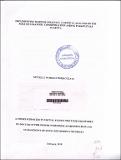Implementing Business Strategy: A Critical Analysis on the Role of Strategic Communication among Parastatals in Kenya

View/
Date
2018-02Author
Mutali J., Namulia Immaculate
Type
ThesisLanguage
enMetadata
Show full item recordAbstract
A review of literature indicates that strategy implementation is an important component of strategic management process. There still exists a high failure rate in the implementation of business strategy as a result of the existence of many potential barriers. The improvement of service performance is one of the most pressing issues facing public organizations in Kenya. The lack of communication-specifically strategic communication in the management structures of organizations has repeatedly been identified as one of the barriers to effective implementation of business strategy. The significance of this study was represented by its attempt to examine the influence of strategic communication on the implementation of business strategy among Parastatals in Kenya. Independent variables under study were communication policy alignment to strategy; adequacy of information communicated; communication channels used and communication activities. The dependent variable was the implementation of business strategy. This study adopted an exploratory approach using a descriptive survey design. The study was anchored on the philosophy of pragmatism; a mixed design involving quantitative and qualitative designs which were used to obtain information from 126 Parastatals drawn from the total population of 187. The target respondents comprised of managers at all three levels in sampled Parastatals in Kenya. The study required the collection of both primary and secondary data for triangulation purposes. The sampling frame entailed all Parastatals as obtained from the Kenya Gazette. Proportionate stratified random sampling was used to select a sample of 378 in selected strata's of 126 statistically selected Parastatal headquarters. Self-administered questionnaires were used to collect the data. A pre-test was conducted on a different sample of similar characteristics to the actual sample to ascertain the reliability of the data collection instruments. Data was analyzed using the Statistical Package for Social Sciences (SPSS) version twenty two and summary statistics such as mean scores, variances, standard deviation and inferential statistics namely; correlation analysis and regression results were used to test the hypotheses. The results provided statistical evidence that a positive and significant influence exists between implementation of business strategy and strategic communication. In the practice, this study recommends that managers must make efforts to consistently communicate the strategic intent to all employees at all levels; have in place communication policies as well as conduct communication audits for proper alignment to strategy. Further, the study acclaims that managers at all levels should be competent communicators in giving correct, clear, timely and easily understandable information to employees to enhance success of implementation. On methodology, the study recommends further studies using experimental designs because strategy implementation is a process and actual effects can only be well captured using a longitudinal approach. Regarding policy, this study recommends that the need for Kenyan government to audit and strengthen existing communication policy frameworks to support and improve implementation of strategic plans. This study therefore is of significance to the Government of Kenya, policy makers and strategic management scholars to use the study findings
Publisher
KeMU
